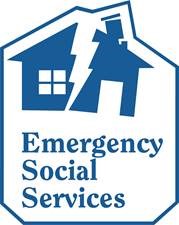
Emergency Social Services
Emergency Social Services
 Emergency Social Services (ESS) coordinates the delivery of services and supports to address immediate, short-term needs in the community, typically for those who have been impacted by an emergency or disaster.
Emergency Social Services (ESS) coordinates the delivery of services and supports to address immediate, short-term needs in the community, typically for those who have been impacted by an emergency or disaster.
During an emergency, services are commonly provided in an evacuation or reception centre that is used as a safe place to receive essentials. Essentials include: shelter, food, clothing, and information about the emergency and how to navigate receiving the proper supports during – and following – the event. ESS coordinates with community partners and municipalities to operate evacuation and/or reception centres.
Following the event, ESS works with various Region of Durham departments, as well as community partners, to assist residents with navigating their displacement journey.
ESS plans, prepares and coordinates the Durham Region Social Services emergency response by facilitating staff training and liaising with Regional departments, municipalities, community partners and stakeholders.
ESS is responsible for managing the departmental emergency plan, business continuity plans, and departmental emergency management-related operating policies and procedures.
Evacuation centres
An evacuation centre may be opened during an emergency, or during the threat of an emergency that may result in the displacement of a large number of people. In municipal emergencies, the municipality will decide when and where to open an evacuation centre and may ask The Regional Municipality of Durham for assistance. Emergency Social Services has plans in place with the local area municipalities across the Region to offer residents a safe place to go if there is a need to evacuate.
| What is an evacuation centre? |
| An evacuation centre is a community facility used to support the response to an emergency, where residents may go to receive essential services. |
| What should I bring to an evacuation centre? |
| Bring essential items to an evacuation centre. These items may include medications, clothing, important documents (such as identification or insurance papers) and any other important personal items. Please note, always have a backup of essential documents, whether online or in a secure place. |
| Can I bring my pet? |
| Yes, there is a special area for your animals; please bring any personal items for your pet, including blankets, food, muzzle(s) if required, and a cage. No animals, except for service animals, are permitted in the public areas of an evacuation centre. |
| How do I arrive at an evacuation centre? |
| You can walk or drive to an evacuation centre. If you are unable to walk or drive, you may be evacuated to a centre by a bus that is requested due to the emergency. |
| What happens when I arrive at an evacuation centre? |
| You will be asked to register with centre staff, via the registration desk, as well as Canadian Red Cross staff. After registration, you may access other services provided at the centre. |
| What do I do if I've been separated from family or friends during an evacuation? |
| The Canadian Red Cross provides a registration and inquiry service for all persons entering the centre. For missing children, follow the signs to the Child Care and Early Years Division (CCEYD) area. |
| How can I get up-to-date emergency information, while at an evacuation centre? |
| Information about the emergency will be shared via this website. There will also be status boards located in the centre or you can talk to staff at the information desk. |
| What is the role of the Region of Durham's Social Services Department during an evacuation? |
|
The magnitude of the departmental response will vary based on the scope of the emergency. However, the Social Services Department is response for the delivery of Emergency Social Services, which may include:
|
Resources
Contact Us




